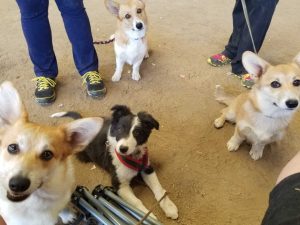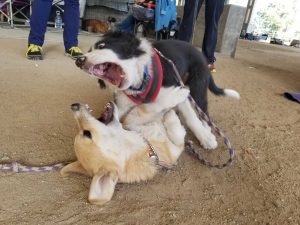New Puppy Series: A Short Guide on Puppy Socialization
Are you thinking about bringing home a new puppy soon? This blog mini-series is for you! In this post, we go over the importance of puppy socialization. The puppy in the pictures is Logic, the newest addition to the Zurborg family!
In our puppy socialization classes, we pass out a list of all the things you’ll want to show your new puppy so that they can have good exposure to the world we live in. Take a look at our Puppy Socialization Checklist.
What is Puppy Socialization? 
First, we need to discuss what “puppy socialization” is. Puppy socialization is simply being near all the things we want them to be comfortable with. They don’t have to interact with them.
For instance, being around other dogs doesn’t always have to include a wrestling session. Seeing children at a park doesn’t have to include petting. The level of interaction can be increased or decreased depending on the puppy’s age and level of fear.
Most people know science and research back up our belief that safe socialization far outweighs the risk of disease. You should begin socializing your puppy around 9 weeks of age.
How you socialize your puppy is very important! A good puppy socialization strategy takes into account age, temperament, and natural and learned fears. It’s also important that you have great observation skills and pay close attention to your puppy so you can adjust your plan as needed.
How to Handle Fear
It is perfectly normal for puppies to show fear. This is nature’s way of keeping them safe while they are still learning. You should expect that your puppy will show fear on most of your outings at some point. The level of fear will depend on the individual dog. It may be a fleeting moment or a full blown meltdown.
There are many things you should prepare for. Socialization around noises, people, traffic, gardeners, dogs, and other animals should be in short bursts. You should be ready to “train” your puppy through these experiences.
Hopefully, you have already taught your puppy some basic skills like their name, sit, nose touch, spin, and paw. When you are ready to socialize, be prepared to work your “cues” and deliver treats. Most people are just quiet and let the puppy stare a lot at the distractions.
Puppies need feedback on how to behave and what they should focus on. It’s okay to look at distractions, but they should be able to focus on you too!
Logic’s Socialization Adventures 
Puppy Logic is now just over 11 weeks old. He has already met at least 25 dogs, 50 people, and a horse. He has been to 2 different agility shows, 3 different homes, 3 vet visits (only one was for real), 3 puppy classes, and countless car rides. I have also found a few locations where it was safe for him to have off-leash romps for exploration.
In every situation, he received at least 20 rewards for responding to his name and recalling to my hand. We practiced lots of group photos with other dogs where he learned to remain calm and wait for his turn to take the treat.
Logic’s Fear
At 9 weeks old, I discovered Logic developed a fear of people who bent over him to pet him. It started with him backing away and progressed to hiding behind me within a couple days. I recognized this as a potential future problem, so we changed strategies.
We did a few different things depending on the situation. I started picking him up and letting people feed him when they approached. He responded positively to this. This worked well for people that were very tall, loud, or fast moving.
I also asked people to sit on the ground to interact with him. He was happy to sniff them, eat treats, and interact if they were on his level. I also rewarding him heavily for sitting and looking at me when people approached, however I asked people to not pet him (because that would involve leaning over him).
Most of my outings included an adult calm dog who loved strangers. The strangers would pet the adult dog and then Logic felt comfortable to engage too.
I also made good decisions on what he was ready for. Outdoor markets and restaurants would certainly scare him! We kept to smaller environments with dog people who gave him the positive feedback he needed. Now at 11 weeks old, his shyness is already subsiding.
Next week he will start daycare and learn how fun the people at Wags are!
If you have any questions about puppies, feel free to contact us or sign up for a puppy group class!
